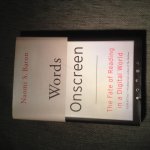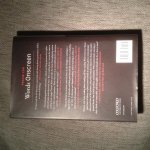Baron, Naomi S. - Words Onscreen / The Fate of Reading in a Dig
| Schrijver: | Baron, Naomi S. |
|---|---|
| Titel: | Words Onscreen / The Fate of Reading in a Digital World |
| ISBN: | 9780199315765 |
| Taal: | Engels |
| Uitgever: | Oxford Univ Pr |
| Bijzonderheden: | 2015, 304pp, Gebonden, Hardcover met S.O. |
| Prijs: | € 9,00 (Excl. verzendkosten) |
| Meer info: |
boek is als nieuw, s.o. kent wel stootrandje,
brievenbuspost trefwoorden Words Onscreen The Fate of Reading in a Digital World Naomi S. Baron A fascinating and timely look at how technology affects the way we read Supported by the author's empirical data from an international sample of readers A lively discussion of the consequences—many unforeseen—of the growing shift from print to digital reading Science & Mathematics Engineering & Technology Electronics & Communications Engineering Communications Engineering & Telecommunications Science & Mathematics Engineering & Technology Electronics & Communications Engineering Electronics Engineering Arts & Humanities Language Teaching & Learning Literacy People have been reading on computer screens for several decades now, predating popularization of personal computers and widespread use of the internet. But it was the rise of eReaders and tablets that caused digital reading to explode. In 2007, Amazon introduced its first Kindle. Three years later, Apple debuted the iPad. Meanwhile, as mobile phone technology improved and smartphones proliferated, the phone became another vital reading platform. In Words Onscreen, Naomi Baron, an expert on language and technology, explores how technology is reshaping our understanding of what it means to read. Digital reading is increasingly popular. Reading onscreen has many virtues, including convenience, potential cost-savings, and the opportunity to bring free access to books and other written materials to people around the world. Yet, Baron argues, the virtues of eReading are matched with drawbacks. Users are easily distracted by other temptations on their devices, multitasking is rampant, and screens coax us to skim rather than read in-depth. What is more, if the way we read is changing, so is the way we write. In response to changing reading habits, many authors and publishers are producing shorter works and ones that don't require reflection or close reading. In her tour through the new world of eReading, Baron weights the value of reading physical print versus online text, including the question of what long-standing benefits of reading might be lost if we go overwhelmingly digital. She also probes how the internet is shifting reading from being a solitary experience to a social one, and the reasons why eReading has taken off in some countries, especially the United States and United Kingdom, but not others, like France and Japan. Reaching past the hype on both sides of the discussion, Baron draws upon her own cross-cultural studies to offer a clear-eyed and balanced analysis of the ways technology is affecting the ways we read today--and what the future might bring. 92 Percent of College Students Prefer Reading Print Books to E-Readers By Alice Robb January 14, 2015 Readers have been dreading the rise of e-books since before the technology even existed. A 1991 New York Times piece predicting the imminent invention of the personal e-reader spurred angry and impassioned letters to the editor. One reader wrote in to express his worry that the new electronic books wouldn't work in the bath. Most Popular Amazon Is Thriving Thanks to Taxpayer Dollars Mormonism’s Crisis of Faith Trump’s Global Bigotry Trump’s Alarming Definition of Treason Welcome to Hell Twenty-three years later, half of American adults own an e-reading device. A few years ago, Obama set a goal of getting e-textbooks into every classroom by 2017. Florida lawmakers have passed legislation requiring public schools to convert their textbooks to digital versions. Despite the embrace of e-books in certain contexts, they remain controversial. Many people just don’t like them: They run out of battery, they hurt your eyes, they don’t work in the bath. After years of growth, sales are stagnating. In 2014, 65 percent of 6 to 17-year-old children said they would always want to read books in print—up from 60 percent two years earlier. Though it has been over 15 years since Project Gutenberg starting publishing classic literature online and seven since Amazon launched the Kindle, research into how e-books change readers’ experience has been scarce. Defenders of print books usually rely on anecdote or intuition—which can make it easy to dismiss them as Luddites or romantics. And the relative lack of data has sometimes forced them to resort to the hyperbolic—Andrew Piper proclaiming that e-reading isn’t reading at all—or the petty—Peter Conrad complaining that e-readers don’t align margins the way he likes. With her new book, Words Onscreen: The Fate of Reading in a Digital World, Naomi Baron, a professor of linguistics at American University, brings more data to the case for print. Baron and her colleagues surveyed over 300 university students in the U.S., Japan, Germany, and Slovakia, and found a near-universal preference for print, especially for serious reading. (She finds that the format doesn’t matter so much for “light reading.”) When students were given a choice of various media—including hard copy, cell phone, tablet, e-reader, and laptop—92 percent said they could concentrate best in hard copy. “The group we assumed would gobble this up were teenagers and young adults,” says Baron. “But they talked about things I didn’t think 18 to 26-year-olds cared about anymore.” Alice Robb: Why are young people—who are accustomed to doing most things on screens—resistant to e-books? Naomi Baron: There are two big issues. The first was they say they get distracted, pulled away to other things. The second had to do with eye strain and headaches and physical discomfort. When I asked what they don’t like about reading on a screen—they like to know how far they’ve gone in the book. You can read at the bottom of the screen what percent you’ve finished, but it’s a totally different feel to know you’ve read an inch worth and you have another inch and a half to go. Or students will tell you about their visual memory of where something was on the page; that makes no sense on a screen. One student said, “I keep forgetting who the author is. In a print book all I have to do is flip back and I see it.” There are all kinds of reasons students will give—“I have a sense of accomplishment when I finish a book and I want to see it on the shelf.” They care about the smell of a book. In the Slovakian data, when I asked what do you like most about reading in hard copy, one out of ten talked about the smell of books. There really is a physical, tactile, kinesthetic component to reading. AR: So students feel like they’re learning more when they actually read books in print, but do we know whether they actually retain more? NB: Generally speaking, if you give standardized tests on comprehension of passages, the results are about the same on a screen or on hard copy. There are a number of studies that have been done in different countries—in Germany, Austria, Israel, United States, Norway. But you have to ask: What do you want to measure? Do you want to measure comprehension? That’s a fairly plain, middle-school way of talking about what it means to read. Did you get so involved in that book that you didn’t notice what was going on around you? That you insisted on staying up until three o’clock in the morning? Did you cry? My research shows people are more likely to re-read if they have a book in hard copy. You might see the title on your shelf and think, “I hadn’t thought about that scene in a long time.” There are certain connections we make that go beyond decoding words. AR: You argue in the book that e-books make reading a more social, less personal experience. |

De verkoper zal binnen 3 werkdagen contact met u opnemen om de koop verder af te handelen.
Het huisnummer is ook opgegeven in het straat veld. Gelieve controleren of de velden straat en huisnummer correct zijn opgegeven.
Straat:
Nummer:
- Alle boeken zijn compleet en verkeren in normale antiquarische staat, tenzij anders beschreven. Kleine onvolkomenheden, zoals een ingeplakte ex-libris of een naam op het schutblad, zijn niet altijd vermeld
- U handelt deze order direct af met Kautskie
Deze verkoper is een particulier, dit heeft invloed op welke rechten voor u als koper ontbreken. Zo heeft u geen herroepingsrecht of conformiteitsrecht. Verder lezen. - Na uw bestelling ontvangen u en Kautskie een bevestiging per e-mail. In de e-mail staan de naam, adres, woonplaats en telefoonnummer van Kautskie vermeld
- De Koper betaalt de verzendkosten, tenzij anders overeen gekomen
- Kautskie kan betaling vooraf vragen
- Boekwinkeltjes.nl probeert Kopers en Verkopers tot elkaar te brengen. Boekwinkeltjes.nl is echter nimmer partij bij een overeenkomst die gesloten wordt tussen Koper en Verkoper door gebruikmaking van de site. Als u een geschil hebt met één of meer gebruikers, dient u dit zelf op te lossen. U vrijwaart Boekwinkeltjes.nl van enigerlei vorderingen, aanspraken op schadevergoeding en dergelijke, verband houdende met dergelijke geschillen.
Onthoud mijn gegevens
Registreer u vrijblijvend als koper!
Besteld, hoe nu verder?
De verkoper zal binnen 3 werkdagen contact met u opnemen om de koop verder af te handelen. Afhankelijk van uw locatie heeft u in de meeste gevallen binnen 2 dagen uw bestelling in huis.


